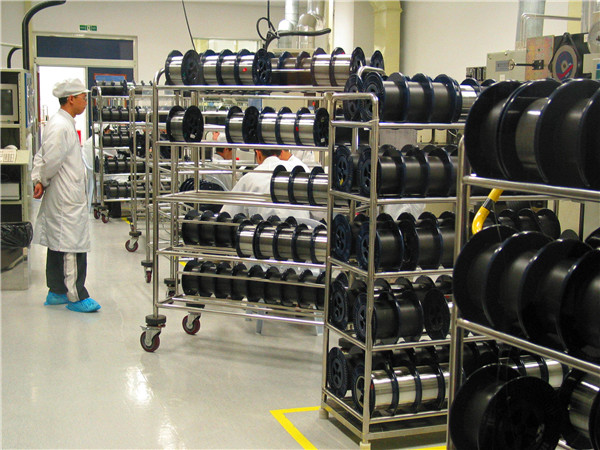 |
|
A worker monitors optical fiber equipment at a workshop of Yangtze Optical Fiber and Cable Joint Stock Limited Company. It has so far set up joint venture companies in Myanmar, Indonesia and South Africa.GONG HONGBIN/CHINA DAILY |
Yangtze Optical Fiber and Cable expands its world footprint with focus on three factors
Yangtze Optical Fibre and Cable Joint Stock Limited Company, the largest optical fiber cable manufacturer by output in the world, is expanding its global market to regions where telecommunication is underdeveloped.
The move follows its initial public offering in Hong Kong in December 2014. It has already set up joint ventures in Myanmar, Indonesia and South Africa.
In January 2015, YOFC signed a cooperation agreement with Indonesia PT Monas Permata Persada to establish a joint-venture optical fiber cable factory in Indonesia.
The JV was set up with an initial capital of $10 million. YOFC holds a 70 percent stake in the JV, the first of its kind in Indonesia, and YOFC's first JV overseas.
Indonesia's population of 252 million is the fourth largest in the world. Yet, internet use and broadband penetration are relatively low due to the slow development of the country's telecom industry. The Indonesian government has introduced a national broadband plan recently though.
In March 2015, YOFC set up a joint venture in Myanmar with a local optical fiber cable producer. The JV's output will be 1 million kilometers of cable per annum.
"We consider three factors when investing abroad," said Zhuang Dan, president of YOCF.
"First is the economic development, which has a great bearing on the demand for broadband. Second is the growth potential of the internet, broadband and mobile telecommunications. Third, the country's population has to be relatively large," said Zhuang.
He said Myanmar and Indonesia fit the bill. The next focus of overseas expansion will be Africa, he said.
Established in 1988, YOFC is itself a JV by three partners: the China Huaxin Post and Telecommunication Economy Development Center, Wuhan Yangtze Communications Industry Group Company Ltd and Draka Comteq of the Netherlands. Its portfolio mainly covers three areas: fiber preform, optical fiber and cable.
YOFC is the largest fiber preform supplier and the second largest optical fiber and cable supplier in the world. Its products are sold to more than 50 countries. It has 22 offices overseas. In 2014, the company was listed on the Hong Kong stock exchange.
YOFC's JV in South Africa is its first project in Africa. YOFC will also establish a bonded warehouse in South Africa to sell optical fiber cables imported from its China factories to the rest of Africa.
The Africa JV is based in Johannesburg with initial planned production capacity of 1 million kilometers per year. It will start operations in the fourth quarter of this year. It is expected to become a base for YOFC to cover the African market. It could turn out to be one of the most competitive optical fiber cable suppliers on the continent.
According to Richard Mack, chief analyst of CRU, a London-based consulting firm for global commodity industry pricing, the top three regions in terms of demand for optical fiber cables are Southeast Asia, Africa and Latin America. They are also net importers of optical fiber cables. Of the more than 100 countries in these regions, only 12 have their own optical fiber cable manufacturers.
According to Mack, total demand in the three regions in 2014 was 30 million kilometers, only 20 percent of China's demand in the same year. Yet, they have great potential for growth as operators update telecommunication networks to improve their fixed and mobile broadband services.
Mack estimates the annual growth rate in the next five years in the three regions will be more than 10 percent.
The optical fiber cable market in China and abroad has great potential for growth, said Zhuang.
"China's national initiatives for the convergence of the telecommunication, internet and broadcasting networks into one eco-system and the 'Internet Plus' strategy have created a potential large market for the optical fiber cable industry," said Zhuang.
